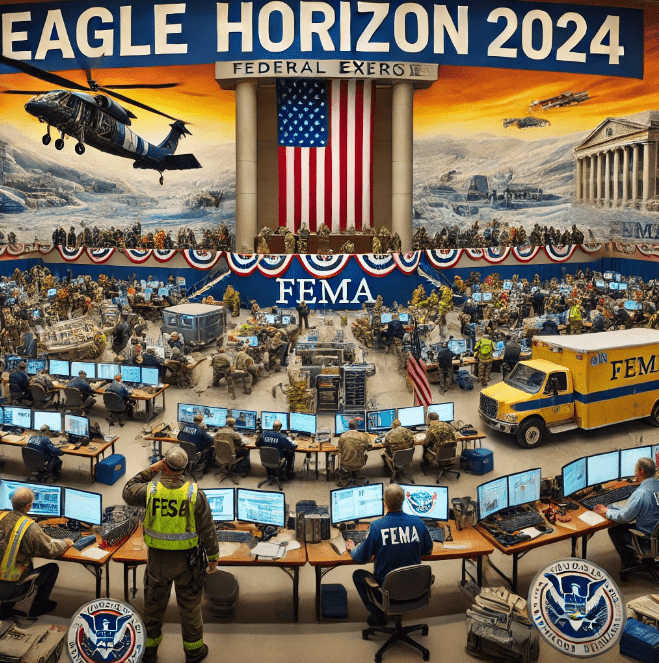
Introduction
Eagle Horizon 2024 is a critical federal-wide exercise designed to evaluate and enhance the continuity of operations across U.S. government agencies. Coordinated by the Federal Emergency Management Agency (FEMA), this exercise will take place on July 23-24, 2024, and is a vital component of the national preparedness strategy. The exercise aims to test and improve the capability of federal departments and agencies to maintain essential functions during significant disruptions, including national emergencies.
Objective and Scope
The primary objective of Eagle Horizon 2024 is to assess the federal government’s ability to execute its continuity of operations plans effectively during a severe crisis. This involves simulating a major disaster scenario, such as a catastrophic natural event or cyber-attack, that could potentially disrupt normal government operations. The exercise will focus on evaluating key aspects of federal continuity planning, including:
- Operational Resilience: Ensuring that federal agencies can continue essential functions without interruption.
- Coordination and Communication: Testing the effectiveness of interagency coordination and communication channels during crises.
- Recovery and Stabilization: Evaluating the strategies and processes for rapid recovery and stabilization following a major incident.
Key Components of the Exercise
-
Scenario Simulation: The exercise will simulate a large-scale crisis scenario involving a major natural disaster, such as a hurricane, impacting critical infrastructure and necessitating a response from federal agencies. In this scenario, disruptions will affect key areas like transportation, communications, and public safety.
-
Agency Participation: All executive branch departments and agencies are required to participate in the exercise. This ensures that every facet of the federal government’s continuity planning is tested, including decision-making processes, operational procedures, and communication strategies.
-
Continuity Operations: Agencies will practice relocating to alternate facilities, activating backup systems, and maintaining operations under simulated conditions. This includes testing continuity plans for various functions such as command and control, data management, and resource allocation.
-
Evaluation and Feedback: FEMA’s National Exercise Division (NED) will oversee the evaluation of the exercise. This includes observing and assessing agency responses, collecting feedback, and identifying areas for improvement. The results will be compiled into an After-Action Report/Improvement Plan, which will outline lessons learned and recommendations for enhancing continuity planning.
Steps Involved in Eagle Horizon 2024
-
Pre-Exercise Preparation:
- Planning: FEMA collaborates with federal agencies to develop the exercise scenario, objectives, and evaluation criteria.
- Training: Agencies participate in pre-exercise training to familiarize themselves with the exercise procedures and expectations.
-
Exercise Execution:
- Scenario Activation: On July 23-24, the exercise scenario will be activated, simulating a major crisis event.
- Operational Testing: Agencies will implement their continuity plans, relocate to alternate facilities if necessary, and carry out their assigned roles and responsibilities.
- Coordination and Communication: Agencies will engage in simulated communications and coordination efforts with other federal entities and stakeholders.
-
Post-Exercise Review:
- Evaluation: FEMA’s National Exercise Division will evaluate the exercise performance, including agency responses, coordination, and adherence to continuity plans.
- Debriefing: Agencies will participate in debriefing sessions to discuss performance, challenges, and successes.
- Report Generation: An After-Action Report/Improvement Plan will be generated, summarizing the findings and providing recommendations for future improvements.
Impact and Importance
Eagle Horizon 2024 is a crucial exercise for ensuring that the federal government is prepared to handle significant disruptions effectively. The exercise has several important impacts:
- Enhanced Preparedness: By testing continuity plans and coordination efforts, the exercise helps to identify gaps and areas for improvement, leading to stronger preparedness for real-world crises.
- Improved Coordination: The exercise fosters better communication and collaboration among federal agencies, which is essential for effective crisis management.
- Increased Resilience: Strengthening continuity operations helps to ensure that essential government functions can continue without interruption during major incidents, enhancing overall resilience.
Conclusion
Eagle Horizon 2024 is a key component of the federal government’s continuity planning and preparedness strategy. By simulating a major crisis scenario and testing the effectiveness of continuity plans, the exercise aims to improve the ability of federal agencies to maintain essential operations during significant disruptions. Through rigorous testing, evaluation, and feedback, Eagle Horizon 2024 will contribute to a more resilient and prepared federal government, better equipped to handle future challenges and ensure the continued delivery of critical services to the American people.



